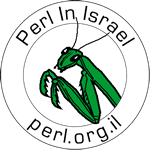Call for Speakers
Submit Your Talks Now
Our call for speakers is officially open. The theme of our workshop is "Perl in Practice". That means we're interested in the practical side of Perl. We want to hear about things that solve practical problems.
You must submit talks online via this site. Please note that proposals must be submitted by midnight (ILT) on 20th December, 2011. After midnight (ILT) on 20th December, 2011 we will check the talks. If we have enough good talks we won't wait for the later submissions.
Here are some general ideas to spur your thinking.
"Developing a modern Web application with Perl"
In the recent years several new frameworks have been developed for Perl. Talks about Catalyst, Dancer, Mojolicious, or PSGI are all welcome! We would also be happy to get proposals for talk about the front-end part of the development. That means we are also interesed in talks about CSS, JavaScript, (e.g. JQuery), HTML5 and web design in general.
Using Perl with other commercial applicatins
There are several commercial applications that make use of Perl. For example IBM ClearCase and the Oracle database both come with a version of Perl. It would be interesting to hear talks on using Perl in such and similar commercial settings.
"I Couldn't Do It Without Module X"
Is there a module (or three) that you find fantastically useful? Well, why not tell everyone else about it. And yes, it's okay if you wrote the module yourself, as long as it's on CPAN.
Doing File/Network IO/Daemons/Web Services with Perl
Do you know how to do some specific thing with Perl that you'd like to tell people about?
My Great Perl Project
Did you work on an interesting project that used Perl? Tell us about it.
Debugging/Testing/Profiling Perl
Debugging, testing, and profiling are always important with any language. If you have some tips we'd like to hear them.
Perl and Some Other Thing
Interfaced with another system in Perl, maybe a web service, a legacy app, or another language? Tell us how you did it.
Software Development in General
Topics that go beyond Perl, such as testing, managing technical debt, or development practices are all fair game.
Tracks
There will be two tracks at Perl Workshop in Israel,2007, one
for beginners and one for intermediate to
advanced talks.
We have not decided yet if the tracks are going to be in parallel
in two separate rooms or mixed in one room.
The beginners track is aimed at people who are new to Perl or programming in general. Good talks for this track might be those that cover a basic module everyone should know about, or introduce a few intermediate-level regex features.
When submitting a talk for either track, please make sure to tell us what you expect from your audience, such as knowing about certain Perl features or modules, or maybe familiarity with web programming idioms.
The intermediate to advanced track is pretty much wide open. Anything goes, as long as it fits in with our "Perl in Practice" theme.
Talk Length
Talks can be either 20 or 40 minutes. We encourage people to submit 20 minute talks, as we'd like to include as many speakers as possible, and 40 minutes is pretty long to sit and listen to someone anyway.
If you're a first-time speaker, we strongly suggest you submit a 20 minute talk, as a successful 40 minute talk takes some practice.
We'll also be doing a Lightning Talk session. More details on that TBD.
Common Questions and Answers
Can I submit multiple talks?
Yes, please do! More talks give us more to choose from, which is really helpful for us.
I'm not a big name, who wants to hear me?
We do. As a community, we want to encourage people to step up and try new things, so we're really excited to see submissions from new people. All the well-known speakers of today were first-timers once.
My topic really needs more time!
No, it doesn't. People have short attention spans when listening to people talk, and it takes a very experienced speaker to make long sessions work. Pick the highlights for your topic and if it's interesting people will get in touch with you outside your talk to discuss it.
Why is this a call for speakers, not papers?
Yes, it's traditional to call it a "call for papers", but have you been to a YAPC, OSCON, or Perl workshop recently where someone wrote a paper?


